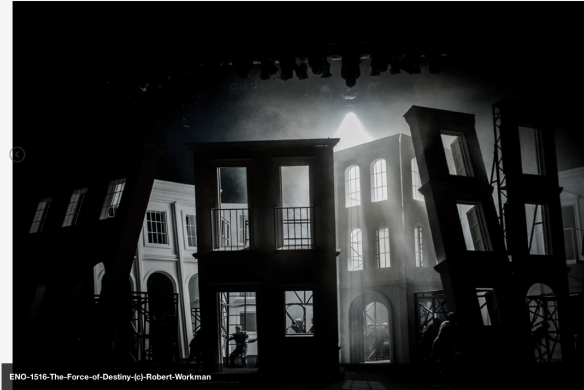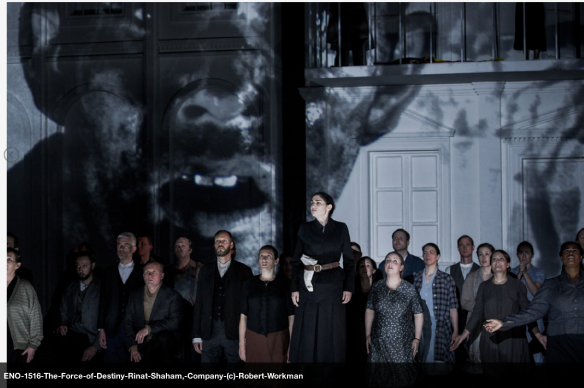This about opera, but I have a feeling I’ve been sent a lesson about writing too.
Last night I went to a performance of one of Verdi’s lesser known operas, La Forza del Destino – correction, since I saw it in English – The Force of Destiny. Powerful stuff, you might think, with a title like that. Well certainly complex, with a lifetime of doomed love and revenge for all three of its main characters.
The music for this opera is sublime; a parade of moving tunes and orchestral subtlety, with some humour and drunken revelry to lighten the inevitable fated march of all concerned. It is, however, VERY difficult to stage. It takes place in both Italy and Spain over a number of years, includes battles, pub scenes, a church and a hermitage.
This director opted for The Spanish Civil War (Verdi set his battles in Italy) and EVERYTHING else he could lay hands on. War is not funny, so all of the humour was stripped out (funny arias and characters turned particularly nasty). War is cruel, sadistic and misogynistic – true – so all these factors were hammered home. However, you can actually have too much of a bad thing. When the audience starts to wonder how far the priest is into S & M, or what they are using for blood (in every single scene), or why a warhorse is hovering over a building and was there really a public tearing up of books in that war, and surely that bare girl running was from Vietnam, you have lost the plot and replaced it with too many ideas. You have also splintered your viewer/listener’s attention.



Verdi wrote a classical tragedy, in which the fates deal cruelly with three particular people in a volatile world. The drama of their story deserves as much respect as the music and much more than the setting.
I have another problem with this production. I go to opera for the music and the drama. Understandably, musical ability trumps all else when casting. However, if the director chooses singers who have no physical resemblance to, or are of a different age from, the people they are playing, he/she should (at the very least) minimise the discrepancies by adapting costumes and staging where necessary so that the drama is not lost, or the singers made a mock of, OR the opera become the joke stereotype of its genre (as this was in the first act – image below). In the centre (back to us) you have the beautiful, pure, young woman, whose father (left) refuses to let her marry the young soldier (right) because he is not noble. After killing her father in error, the soldier flees and later (disguised) will become a hero in the army and blood-friend of the girl’s brother (see image 2 above). This brother (also disguised) is searching for the soldier and his own sister to kill them. The girl (not much disguised) enters a hermitage. Everybody dies.
In the centre (back to us) you have the beautiful, pure, young woman, whose father (left) refuses to let her marry the young soldier (right) because he is not noble. After killing her father in error, the soldier flees and later (disguised) will become a hero in the army and blood-friend of the girl’s brother (see image 2 above). This brother (also disguised) is searching for the soldier and his own sister to kill them. The girl (not much disguised) enters a hermitage. Everybody dies.
Finally, you can say stuff in Italian that sounds absurd in English. Italian words end in vowels (of which there are few) so many of the lines naturally echo each other. This is emphatically not the same as a rhyming couplet in English, which, unless handled by a skilled poet, often has a nursery rhyme humour to it.
Hope you enjoyed the pictures – all screenshots from the English National Opera website – if not the rant.

I wouldn’t call myself an opera afficionada, but I do know and love La Forza del Destino, and this sounds like a real travesty. It reminds me of what some directors do to Shakespeare’s plays as well. It seems to me an adolescent or hubristic need that attempts to revise history–both political and artistic. And it’s often done to such a degree—probably with the assumed need to communicate better with current audiences—-that the original is completely gone. The first time I ever walked out on a performance was when I just couldn’t take such a butchering. I did enjoy the photos, Hilary. Thank you.
Yes, I so wanted my theatre director daughter on the job. She researches and researches and then works from the text out, whether it’s Shakespeare or written yesterday. Her casts are worked hard, and nurtured carefully. The photos are their official ones… there are no more of the two main characters.
Such a shame, fabulous review though, I was disappointed when I heard Don Giovanni was going to be sung in English with Italian arias because some things just don’t translate well but it will be a real challenge and I’m looking forward to it. Another opera to investigate thank you
A lot depends on the translation. I think it can work a bit better with Mozart, though I may be wrong. It’s all experience.
Sometimes trying too hard can invade the beauty of simplicity. This is something I’m working on technically at the minute.
In intrigued which idea you felt worked the best?
That’s difficult. The Spanish Civil War setting could have worked, if they had not tried to add in the extra films and references, and made Preziozilla and Melitone (the lighter characters) into an ironic bully and a vile chauvinist as well. I’m not sure I have the answers, it is a difficult opera, but I have seen it several times – all better productions. The singing was pretty good, but casting difficult to swallow.
I wouldn’t call it a rant. It sounded to me like a perfectly good explanation of the way to spoil classic plays and opera by trying to be too clever. It seems that the director is attempting to build up his own reputation on someone else’s foundation. On the other hand, we have a Shakesperean Theatre Company in Australia that produces Shakespeare very simply in modern clothes and settings but the original script and they let the words speak for themselves. I would always take my English classes to one of their productions because it made it so easy to deal with in class later.
Yes, you are right. It is essential to attend to the text first, even in opera. Sometimes really crazy ideas work, but what rarely works is several ideas at once. Verdi was a dramatist and cared deeply about the libretti of his operas. I have to say, though, that convincing versions of Forza are thin on the ground.
When things look and feel complicated, it is often hoped people will see it as ‘art’.
Yes, I think you’re right. The director is waving madly hoping to be noticed as the artist, when he should have been showcasing Verdi and the singers, not himself.
Great review/rant Hilary (and it sounds to me like the rant was warranted). I think Gerard got it right – definitely looks like the director was trying to be noticed and possibly to distract people from the less than acceptable casting.
Operas like these always make me think of Victor Borge’s little piece when he describes an opera. 🙂
I LOVE the Victor Borge piece. I think it includes the memorable sentence … and then she stabbed herself … between… the two… big… trees.
[desperately trying to hold back laughter] Gasp! Oh, don’t make me laugh! [winces] 😀 I can still say it just the way he did with that fabulous pause. So many great lines in that piece. “He goes behind the tree right away.” Gasp. Oh, now I’m making myself laugh. No more Victor Borge for a month…. 😀
Now you’ve got me in trouble. I have to cross my legs. I’m going to find the LP tomorrow.
So nice to be among lovers of Victor Borge…..
Nice rant, Hilary. Very well done. (grin) –Curt
I felt much better when I’d put it all down.
This seems to me an excellent analysis and by no means a rant. In my limited experience directors often feel they have to come up with a new take on their material, whether there is a new take is to be had or not.
I still remember a Wagner production where the cast were obliged to leap from one inclined plane to another holding long spears. What struck me most was their efforts to maintain a balance after they landed – not the main point of the piece, I thought.
{Confession: The last opera I went to was Dalibor. I left half way through because the story was so idiotic I couldn’t sand it.)
Like your Wagner production, the operas that make most mad are the ones where the designer has made life difficult for the singers. I have seen a production where the slopes were so steep the singers were clearly terrified, and in this Forza, the heroine was unsuitably clad (given her physique) and then half stripped (by the priest) – she still sang well, but it didn’t look good. Done well – especially Verdi – operatic stories can be convincing and moving.
So, here’s another of your many awesome talents on display, Hilary: theatre reviewing! I actually understood this, all the way through. (smile) A good reminder about the danger of too many ideas — for storytellers of all kinds.
I’m glad it made sense. I admit I do love opera, though I think if you see the same operas many times in different productions, it may be that you get a jaded palate and are more critical than an audience coming to it fresh. It’s good, though, that something positive (in this case a lesson on writing for me) can come out of my reactions.
It certainly looks incredibly impressive, if you’re a production designer. But I imagine that’s missing the point a little.
I was very impressive, very exciting and very distracting, and the building elevations moved about the stage in the most alarming way. At one point we could see and hear a lot of workmen erecting ladders behind a sloping elevation and then see them releasing the steel wires that went up into the flies. I like sculpture Happenings, but I had paid for an opera.